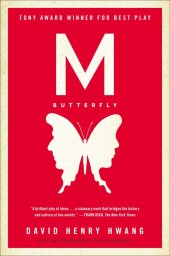
M. Butterfly - With an Afterword by the Playwright. Winner of the Tony Award
| Verlag | Penguin US |
| Auflage | 1994 |
| Seiten | 100 |
| Format | 14 x 20,3 x 0,7 cm |
| Gewicht | 91 g |
| Artikeltyp | Englisches Buch |
| ISBN-10 | 0452272599 |
| EAN | 9780452272590 |
| Bestell-Nr | 45227259EA |
M. Butterfly, a play by Henry David Hwang, cleverly manipulates stereotypes about race, gender, and sexuality from the Puccini's Opera, Mme Butterfly. In Mme Butterfly, an American serviceman buys a Vietnamese wife for a price equivocal to pocket change. She is the epitome of the doting, submissive Asian stereotype. The American boasts that, like a Butterfly, the woman is so tame that she'll eat from his hand. During his stint in her country, she bears a baby boy. Yet, soon afterwards, the man is sent back to the United States, leaving the heartbroken wife waiting for his return. Finally, when she realizes that he is lost forever, she commits suicide so that at least her son will have a better life. In a heart wrenching scene, the small boy is retrieved by the American's new wife. Her unfailing love and her sacrifice are glorified. Yet, Hwang challenges this submission by playing upon this first M. abbreviation, using the french Monsieur instead of the opera's Madame. In Hwang's play, Song, an assertive Chinese opera singer, asks the American, and the reader, to reconsider his "favorite fantasy, " that of "the submissive Oriental woman and the cruel white man." She asks him, and her reader, to reconsider -"Consider it this way: what would you say if a blonde homecoming queen fell in love with a short Japanese businessman? ... "
However, presumably, Song becomes the American serviceman's Butterfly. Hong illustrates how his confidence, which was weak beforehand, grows because the newfound feelings of superiority that the relationship provides. Yet, as the play progresses, Hwang adds several surprise twists that border on the bizarre to dispel these misconceptions about race aand gender.
Klappentext:
Winner of the Tony Award for Best Play, nominated for the Pulitzer Prize for Drama, and soon to be back on Broadway in a revival directed by the Lion King's Julie Taymor, starring Clive Owen
"A brilliant play of ideas... a visionary work that bridges the history and culture of two worlds."-Frank Rich, New York Times
Based on a true story that stunned the world, and inspired by Giacomo Puccini's opera Madama Butterfly, M. Butterfly was an immediate sensation when it premiered in 1988. It opens in the cramped prison cell where diplomat Rene Gallimard is being held captive by the French government-and by his own illusions. He recalls a time when Song Liling, the beautiful Chinese diva, touched him with a love as vivid, as seductive-and as elusive-as a butterfly.
How could he have known that his true love was, in fact, a spy for the Chinese government-and a man disguised as a woman? The diplomat relives the twenty-year affair from the temptation to the seduction, from its consummation to the scandal that ultimately consumed them both.
M. Butterfly is one of the most compelling, explosive, and slyly humorous dramas ever to light the Broadway stage, a work of unrivaled brilliance, illuminating the conflict between men and women, the differences between East and West, racial stereotypes-and the shadows we cast around our most cherished illusions.
The original cast included John Lithgow as Gallimard and BD Wong as Song Liling. During the show's 777-performance run, David Dukes, Anthony Hopkins, Tony Randall, and John Rubinstein were also cast as Gallimard. Hwang adapted the play for a 1993 film directed by David Cronenberg, starring Jeremy Irons and John Lone.
TEXT OF THE ORIGINAL BROADWAY PRODUCTION
Rezension:
"A brilliant play of ideas ... a visionary work that bridges the history and culture of two worlds."-Frank Rich, New York Times
"Audaciously imaginative ... big in conception and theme, David Henry Hwang joins the first string of American playwrights."-Variety
"Just when you've seen every possible coupling, M. Butterfly presents one of the most provocative and touching of all."-USA Today
"Hwang has something to say and an original, audacious way of saying it. A rarity on Broadway."-Edwin Wilson, Wall Street Journal
